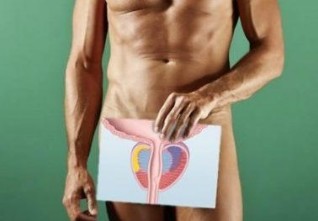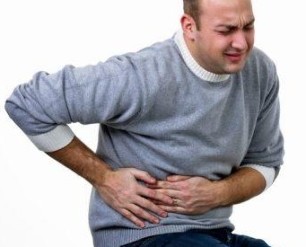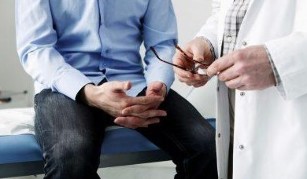The inflammation of the prostate is a serious disease that can lead to serious consequences if not treated. The prostate is located below the bladder.
When inflamed, it increases significantly in size, blocking the neck of the bladder and obstructing the outflow of urine. Therefore, when the first symptoms statements, it is necessary to immediately consult a specialist to identify and begin treatment of prostate.

Main symptoms: what is the prostate?
A long time ago, that this is a disease of older men, but in the modern conditions of life (environment, quality food, fashion, the reckless behavior of young people towards their health, the constant movement of the car, etc.) the inflammation of the prostate is much "younger".
The incidence of young people under the age of 18 years under 5% - which ranges from age 18 to 30 years – 45%, from 30 to 50 years – 20% more than 50 years – 30%. This suggests that to look at the men's health listen to your symptoms it is necessary that at a young age.
There are several types of prostatitis, the form of manifestation (chronic, acute), inflammation (bacterial, stagnant, purulent, infectious, calculous). The symptoms of the disease are different, depending on the type of inflammation of the prostate gland in men.
The symptoms of acute prostatitis:
- malaise (weakness, chills, fever). People are starting to drop, then warm, then cold. Common symptoms are similar to manifestations of the SARS or the flu;
- a sharp increase in body temperature to subfebrile level (37,5-38 C) above;
- strong cut, puncture, pain in the perineum (the area of groin, anus, etc.);
- pain in the lower back, hip, radiating to legs, knees, feet or the leg muscles;
- a sharp pain that seems to be the defecation and straining;
- problems with urination (low / frequent urination, painful or difficult urination). To urinate for a long time (more than 12 hours);
- deterioration of sexual function (poor or no erection, ejaculation, problems with conception);
- on the genitals (in the most severe cases the inflammation of the prostate).
Chronic prostatitis symptoms:
- urinary problems (difficulty urinating, pain, inadequate supply of urine, feeling of incomplete emptying of the bladder, etc.);
- unpleasant, agonizing pain, feeling the dam, between the legs, the groin, the anus. Pain syndrome is not pronounced;
- groin sometimes there may be a sharp pain or an intense burning sensation, like a slingshot;
- General malaise for a long time (sleepiness, apathy, depression, constant fatigue, muscle weakness, etc.);
- nervousness, irritability;
- a small increase in body temperature. Sometimes for a long time can keep low-grade fever;
- decreased sexual function (erectile dysfunction, decreased, or ejaculation, lack of decreased libido, infertility, etc.).

Chronic prostatitis require, such as remission, relapse. In the period of recurrence of the symptoms of chronic form may develop the symptoms, the acute form of the disease.
The symptoms of bacterial shapes:
- signs of inflammation (fever, fever, fever, general weakness, pain in muscles, bones);
- signs of local inflammation of the prostate (pain in the perineum, groin, anus);
- problematic urination;
- change the texture, color and smell of the liquids (urine, prostatic secretion, semen, blood).
The symptoms of the calculous form:
- weak and moderate pain syndrome in the lower back, sacral Class, vagina, anus;
- excruciating pain, burning in the perineum, the groin;
- the pain is greatly increased after sexual intercourse during active movement;
- problems with urination, feeling of fullness in the bladder;
- decreased libido, problems with ejaculation erection (or erectile dysfunction);
- in special cases, the sperm may appear a drop of blood (it turns out bright pink, or bright red).
The symptoms of the congestive form of:
- constant discomfort in the groin, perineum, and anus;
- periodic nagging pains in the perineum;
- troubled urination, not feeling in the end, ina bladder;
- a steady rise in temperature to subfebrile level;
- manifestations of shared inflammatory process in the body (increased erythrocyte sedimentation rate, the blood, malaise, weakness, drowsiness, fatigue, headache, weakness, muscle pain, etc.);
- problems in the sexual sphere (weak erection, and ejaculation, infertility);
- nervous condition, depression, apathy.
The symptoms of the infectious forms:
- the signs of inflammation of the organisation (larger value, the ESR in the blood, muscle pain, increased body temperature);
- aching pain in the lower back, the groin and the perineum;
- pain during bowel movements;
- sharp pain in the groin, or perineum;
- problems with urination (difficulty, frequent urination, lack of urination, etc.).
The symptoms purulent form:
- sudden severe fever (above 38, 5 degrees);
- the signs of inflammation of the organisation (high ESR, muscle pain, fever, chills, etc.);
- pronounced pain syndrome in the groin, perineum, and anus;
- sharp pain in the perineum;
- difficulty urinating, painful urination;
- purulent discharge in the genital.
What are the first symptoms in men?
When you start developing inflammation of prostate in men only be part of the symptoms. The signs of commencing inflammation of the prostate, then special attention should be paid to:

- discomfort in the perineum;
- a periodic weak pain in the groin, or perineum;
- nagging discomfort in the rectum, or the rectum during defecation (in the absence of hemorrhoids);
- the long malaise that is not associated with the SARS, sore throat, flu and other common colds;
- decreased libido, failure of ejaculation erection (temporary absence);
- the decline in the quality of orgasm;
- discomfort in the urethra and groin during sex, or after sex;
- change the texture, color, smell semen;
- the increase in body temperature.
Expressed signs of acute prostatitis:
- raising the temperature to 37,5-40 degrees for no apparent reason (no colds, no flu, no sore throat);
- frequency of urination-increased by 3-4 times, accompanied by sharp pain. The urine flows slowly, with weak pressure;
- burning in the groin, perineum, or defecation. Pain in the rectum during defecation;
- allocation of pus from the rectum or the urethra (if you have a severe, purulent form of the disease).
Expressed signs of chronic prostatitis:
- burning sensation in the groin, or perineum. Burning sensation in the genitals (especially during urination and sex);
- purulent discharge from the urethra after urination, and straining (active or defecation). Purulent discharge from the rectum;
- nervousness, depression, irritability;
- fatigue for no apparent reason, drowsiness.
The pain, the inflammation of the prostate
Almost always, when the inflammation of the prostate, the man finds himself in the cause of the pain syndrome of the character. Typical nagging, aching or sharp pain in the perineum means. The acute form, or if a relapse of the chronic form of the disease, the pain is characterized as the acute onset of sharp, severe pain, cut, and pull. The chronic form of the disease, pain, periodic, wave -like nature. Also the pain can be mild, but constant. Inflamed prostate presses the urethra, bladder neck and the ureter. It channels urine from the bladder, where it may seem painful urination. Also pain during urination can be a sign of infections of the bladder or urogenital system (diseases sexually transmitted diseases Sexually transmitted diseases).
Accompanying pain can be a totally different case. As well as the presence of a number of accompanying prostate pain can be quite inflammation of the prostate, as well as a host of other diseases.
Other causes accompanying pain:
- abdominal pain is a symptom of many other diseases. A graphic example, appendicitis, acute poisoning, infection of the intestines, or the interfaith.
- Lower back hurt due to a herniated disc, degenerative disc disease, nerve, osteoporosis, multiple sclerosis and other spinal diseases.
- pain in the rectum can occur because of hemorrhoids, fissures, bruises, long sitting on an uncomfortable, hard surface, as well as various tumors (benign or malignant).
- Pain syndrome the lumbosacralis spine is more serious. Often the problems of the bones, vertebrae, and disks (osteochondrosis, osteoporosis, displacement, trap, etc.).

Sometimes, pain in the sacrum indicate the problems with other internal organs (kidney, intestines, bladder, or ureter), gynecological diseases, thrombophlebitis, inflammation of the pelvic organs.
- Painful feet can mean a manifestation of flat feet, thrombosis, atherosclerosis, varicose veins, arthritis, osteoporosis, sciatica, and diabetes. There is pain in the legs can be due to various reasons.
The most common is the fatigue, the legs, the muscles of the prolonged physical activity.
What specialist deals with the treatment of the disease?
To diagnose the patient inflammation of the prostate only a qualified urologist. Collect a history and examine the patient. Then send it to the people in the studies (PSA-antigen – a protein for the detection of prostate), or ultrasound of the pelvic organs.
Also, the patient required fees general, blood in urine. All test results urologist can determine exactly the diagnosis, the form, the inflammation of the prostate. Only after these procedures, the doctor may prescribe the individual patient's treatment, including drugs, antibiotics, and other medicines, which are usually home.
A man in the case is 95%, you know exactly what the diagnosis, a doctor because the pain in the inflammation of the prostate is very unique. You need to constantly pay attention to the body, to track all changes that occur to the body. The only way that the people for years to maintain men's health. Launched prostate threatens not only the disease, schizophrenia, and problems with libido, ejaculation, erection, which ultimately can lead to infertility.


























